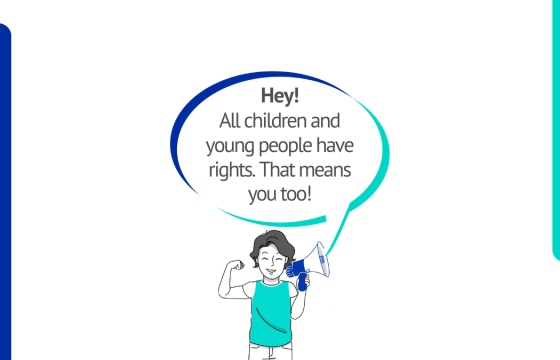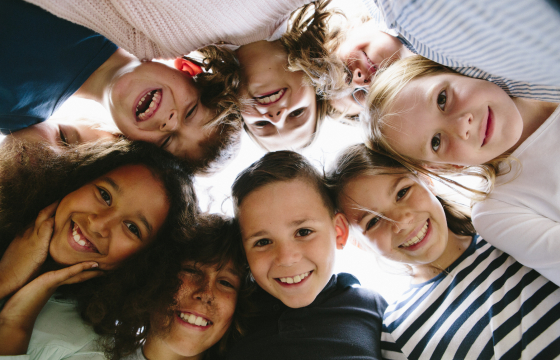«Kinder sind ganze Menschen» – Children are complete people – is the title of the latest edition of “undKinder” magazine from the Marie Meierhofer Institute for the Child (MMI). The edition is devoted to the topic of participation and we have contributed a guest article titled “Protecting children through participation”. In our previous blog post we discussed participation as a concept and process. This time, we would like to focus on the best interest of the child.
It is our vision that all children are able to experience a child-friendly legal system that treats them with dignity, mindfulness, respect and fairness. Moreover, this process should be comprehensible and dependable for all children. In such a system, specially trained professionals listen to children, take their views seriously and ensure that their interests are safeguarded. This enables children and young people to participate actively in decisions that can affect the rest of their lives.
However, the participation of the child does not mean that their subjective will can always be complied with. This is because sometimes the child’s subjective will is contradicted by what is referred to as the interest of the child. In this article we will lay out how to deal with conflicts of interest encountered during official proceedings, and describe what exactly is meant by each term.
The will and well-being of the child = the best interest of the child?
Proceedings that involve children frequently employ terms such as the child’s will, child well-being, the interest of the child as well as best interest of the child. These terms are not always clearly and universally understood.
- The child's will is the subjective needs and desires expressed by the child ("I want to live with my mum.").
- The well-being of the child refers to an ideal state of affairs whose requirement level is defined according to the criteria “ideal”, “sufficient” or “marginal”. The focus here is on safeguarding the rights of the child, including their right to express their subjective will. According to the UN Committee on the Rights of the Child, this necessitates a holistic understanding that encompasses the physical, mental, religious, moral, psychological and social development of the child.
- Protecting child well-being is in the child's interest. As such, it is in their interests that all children's rights are respected.
However, under certain circumstances the child's interest may conflict with their subjective will. In the event of conflicts of interest between participating parties, e.g. the state and the parents, decision-makers are obliged to give priority to the child's interests – hence the term decision-making in the best interest of the child.

Clarity of terminology is particularly important for the cooperation between the various professionals encountered by a child in the course of a proceeding. To properly assume their role and to talk to the child in a child friendly manner, as well as to describe their particular responsibilities and authority, everyone involved must have a uniform understanding of the terms.

So that decision-makers at the court or CAPA can make judgements in the child's best interest, they consult the child's legal representatives as well as social workers, who have a predominant role to play. Here, it is important that the parties – the legal representatives and the social workers – are both well aware of their respective tasks, competencies and responsibilities, and that there are no overlaps. The legal representative takes side with the child and has the task of representing their will before decision-makers. This is outlined schematically in the following diagram.

Advice example – child protection
Fabio lives in a children’s home. At the weekends the eight-year-old visits his mother, who lives with her family. These visits are not a good time for him. He is regularly beaten by a member of the family. Fabio is often left to himself and is given little to eat. One day, he hurts his knee so badly while playing in the playground that he needs stitches, but a plaster will have to do. Eventually, the boy starts to feel sick on Fridays and would prefer to stay at the children’s home over the weekend. Several times, he has told one of his caregiver at the home that he would rather be dead and that he was thinking about the best way to make it happen. The caregiver immediately informed both Fabio's social workers and CAPA. However, no further action is taken. In the children's home is a flyer with the telephone number of the Ombuds Office Children's Rights. Fabio summons his courage and contacts us by phone.
To begin the consultation, we analysed Fabio’s overall situation and then worked to involve all the key people in the discussion. After Fabio contacted us, we explained his rights to him and outlined the options available to him to improve his situation. In intermediary discussions with the social worker and CAPA, and with Fabio's consent, we successfully ensured that visits to his mother would no longer take place where she lives, and only under supervision.
In Fabio's case, a number of his rights were violated: his right to be heard and to express his opinions, his right to information, to a caring environment and to be able to grow up free of violence, as well as the right to physical integrity. By informing Fabio about his rights and by intermediating between him and the professionals involved, the Ombuds Office Children's Rights was able to prevent him from endangering himself and he is protected from further violence and neglect.
We also advise professionals
As a professional, do you have questions related to this subject? Or are you currently involved in a proceeding in which children's rights, such as the right to be heard, are not being respected or in which a conflict of interest has not been decided in the best interest of the child? Please don't hesitate to get in touch with us. You can find out more about protecting children through participation in our in-depth article published in the latest edition of “undKinder” magazine from the MMI – Marie Meierhofer Institute for the Child.

Our flyer for children and young people
Such professionals include child and youth representatives, social workers, CAPA employees, judges, public prosecutors and youth prosecutors, legal child representatives, victim support advisers, assessors, mediators, therapists, school social workers, prison employees, police officers, teachers, migration specialists, doctors, sports directors, foster parents or employees of children’s homes, and others.

Marie Meierhofer Institut für das Kind (MMI)
The Marie Meierhofer Institute for the Child (MMI) is a recognised institute for early childhood. The institute is occupied with the preconditions for successful development and the prevention of problematic developmental processes.
The MMI is working at the interface of developmental psychology, early childhood education and familial-sociological expertise, and combines practice and research in a multi- and transdisciplinary approach.
The MMI is an associated institute of the University of Zurich.









